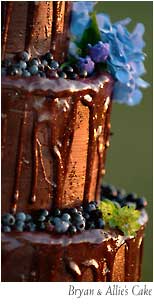 |
Do you carry back-up equipment?
Do you use an assistant?
When will you deliver my photos?
Do you use medium format equipment at weddings?
I'm unsure about digital photography. Convince me.
What are "digitally mastered" images?
On the digital packages, you say there's a CD for safeguarding
the gallery long-term. Can we use the CD to print our own photos?
Do the pictures in the online gallery or on the CD have
the word "proof" or anything typed over them?
You've never shot a wedding at my venue?
Q. Do you carry back-up equipment?
A. Definitely. For your peace of mind and for ours my assistant and I each carry at least two of everything--camera, lens, flash, etc. And, for some items we carry a third, on our person or stashed in the car just in case. Weddings are just too important to take chances!
A. Absolutely! I've been working with shooting assistants since 2004 and I can't imagine working any other way; an extremely talented shooting assistant (second photographer) is what sets my coverage apart from most photographers, who work alone or with an assistant who merely carries equipment or does other non-photographic tasks while the photographer does all the shooting.
No matter how talented the primary shooter is, a good shooting assistant can always contribute to the wedding coverage. That's because so many wonderful things are going on at any wedding and the primary photographer simply can't be in all places at one time. Hiring a team instead of a single photogrpaher means you get photos of the bride getting ready and of the groom getting ready. (Or, of the groom not getting ready but instead going off the rope swing into the lake with his groomsmen. Or fishing. Or drinking beer and watching tv.) It means we can capture the last jittery moments before the bride walks down the aisle and the groom's expression when he first sees her. One of us can get a wide angle overall shot of the ceremony from the church balcony while the other can capture the bride and groom's faces as they exchange vows. One photographer can be inside the reception recording details (the cake, flowers, menu cards, place cards, etc.) while the other photographer is capturing candid photos of your guests enjoying the cocktail hour outside.
During the ceremony when the photographer should be as unobtrusive as possible, having two people working simultaneously lessens the amount of movement either one of them needs to do during the ceremony. Typically my assistant and I take opposite vantage points at the ceremony, which means we can offer you more variety of the ceremony without moving a lot and distracting your guests. And, if--heaven forbid--nasty weather moves your outdoor ceremony into a cramped indoor area where there is just no room at all for moving about during the ceremony, having two photographers means you get two views of the ceremony and not just one.
Q. When will you deliver my photos?
A. Your wedding images should be posted online by your one-month anniversary. If you select a custom-designed album, my goal is to deliver a finished album to you with three months after you approve the layout.
Q. Do you use medium format equipment at weddings?
A. No. I own a medium format system, but I do not carry it to weddings because 35mm equipment is so much better suited for the fast-paced, spontaneous coverage clients want.
When wedding clients wanted large portraits (20x30 and above) to hang on the walls of their homes, using bulky medium format cameras made perfect sense: the larger negatives made better enlargements at those sizes. However,when wedding photojournalism became popular and clients' tastes moved to smaller reprints, the compact, more responsive, 35mm system became the tool of choice.
Modern 35mm equipment is so lightweight that a photographer can easily carry several camera bodies (with a range of lenses) and be ready to respond quickly.
If you anticipate wanting very large (20x30 and above) wall prints made from your wedding photos, then it may be worthwhile to choose a photographer who can shoot those frames on a larger negative. However, if you're looking for spontaneous, emotion-driven, story-telling photos, then 35mm is the best tool for the job.
Q. I'm unsure about digital photography. Convince me.
A. Most consumers do not realize that digital capture is now the norm in professional photography. Newspapers, magazines, advertising campaigns and even weddings everywhere are being produced without a single frame of film.
Of course, since digital images look identical to images captured on film, there is nothing to tip off the consumer to the wide-sweeping changes in professional photography. The professional-grade digital cameras now being used produce images which are just as good as or better than the images produced by traditional film cameras. In fact, many professional photographers report that it's been years since their professional clients have even asked them to shoot film.
Not only is digital just as good as film, but there are many practical advantages to digital. For one, being able to review images immediately means a photographer can improve exposures on the spot. It means photographers can tackle tricky lighting situations (i.e., a dimly-lit church, a bride silhouetted at a window, the tented reception at sunset) with confidence; many photographers report that digital has reinvigorated them, making their work fresher and more creative than before.
Other important advantages of digital include not having to stop and change film every 36 clicks--modern compact flash cards allow us to shoot even hundreds of images before changing cards, being able to shoot in much lower light, being able to decide later on whether a frame will be printed in color or black and white. The list goes on and on. Photographers really do love digital as it allows us to serve our clients better.
After years of working with professional-grade digital cameras and honing my digital mastery skills using Adobe Photoshop, I am excited about the advantages that digital capture and digital processing offer. I use digital exclusively in my educational and magazine work, and I am pleased to offer digital capture for weddings.
I am pleased that digital capture will allow me to give couples the products and package features they want at affordable prices without a sacrifice in quality. I can post galleries for online viewing and ordering, I an provide CDs of images, and with digital post-processing in Photoshop, I can touch up photos defects that in the past went uncorrected unless the client was willing to pay extra for custom work.
Instead of focusing on whether a photographer shoots film or digital, I encourage you to focus on finding a photographer who shoots in a style you like (traditional or photojournalism), who offers the products you want (proofs, online proofing, albums, etc.), and who maintains high standards. Then, give that photographer the freedom to select the tool(s) best suited for doing the job at hand. After all, you probably don't care if the caterer uses a microwave so long as the food tastes great. Or, if the DJ uses real CDs or MP3 files as long as the dance floor stays packed.
Q. What are "digitally mastered" images?
A. Photographers working with digital use the term to refer to a wide variety of image enhancements which are made easier - and much more affordable - by digital capture. In the past - when images were shot only on film - retouching was a labor-intensive and costly endeavor; before the image could be worked on it needed to be converted into a digital file. With the advent of digital capture, files are already digitized, making it much easier - and less costly - for a photographer to improve images before delivery to a client. Digital mastery can be very be subtle, like the slight brightening of a smile. Or, it can be quite dramatic, like swapping open eyes for closed eyes. Simple digital enhancements are routinely included at no extra cost. More extensive enhancements, like removing a person from a group shot, are available at extra cost.
Q. You say there's "a CD of the gallery for viewing the gallery offline." Can we use the CD to print our own photos?
A. The CD that is included in your package at no extra cost contains low-resolution (small) photos like those in the online gallery. Those photos are meant for viewing on a computer screen; they are not large enough for making quality reprints.
You can use the CD for viewing your gallery images off-line if you have a slow internet connection or if you want to take a laptop and show your pictures to someone who has no computer (e.g., a grandparent). If you want to e-mail images to friends, you can take them from this CD. If you have not yet selected the photos for your album before the gallery comes down, you can use the CD to plan your album.
If you want image files large enough to print, you can purchase your high-resolution images for an extra charge.
Q. Do the pictures in the online gallery or on the CD have the word "proof" or anything typed over them?
A. Proofs will not have anything printed across the photos to detract from the images.
Q. You've never shot a wedding at my venue?
A. No, but that shouldn't worry you, as I'll do my homework before the wedding day.
I love to travel and always welcome queries from couples marrying at venues that are new to me. In fact, 95% of the photos in my wedding gallery are from "first weddings" at those venues. Variety is the spice of my life; it keeps me fresh, creative, and excited about my work.
When I book a wedding at a new venue, I'll do my best to visit the site in person beforehand. I spend about 20,000 miles on the road each year, crisscrossing the region for magazine, advertising, education and wedding clients. So, it's highly likely that in the months between the booking and the wedding, other jobs will take me through your area. When they do, I will drop in for a walk-thru, meet the wedding/special events coordinator for the site and ask what's being planned for your wedding. After the walk-through I'll report back to you on what I've seen, make suggestions about where posed photos could be taken, and discuss other details.
If it's not practical to visit the site ahead of time--say the wedding is as far away as New Brunswick, Vermont, or New York--I will arrive early enough on the rehearsal day to thoroughly explore the site and get ideas, which we can discuss before or after the rehearsal. Either way, by the time your wedding arrives, I'll be as ready as the photographer who shoots there several times each year.
